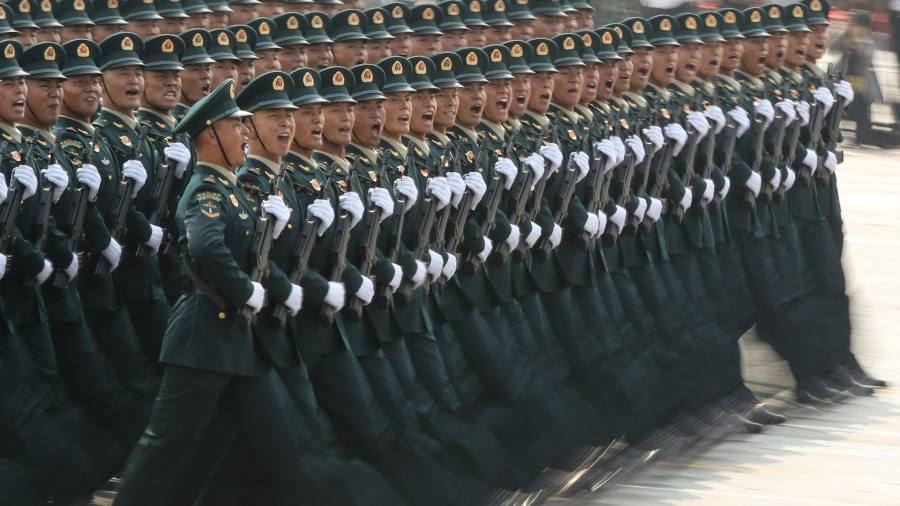Receive free Chinese military updates
We’ll send you a myFT Daily Digest email rounding up the latest Chinese military news every morning.
The writer is a former British diplomat who specialised in China. He is now a fellow of the Council on Geostrategy, the Royal United Services Institute and the Mercator Institute for China Studies
Whatever Yevgeny Prigozhin was plotting in Russia last week — mutiny, insurrection, civil war — this level of military insurrection would never have been possible in China. The Chinese Communist party exerts tight control over its military forces. The People’s Liberation Army is the party’s army and not a national army. The idea that anyone outside the PLA and the People’s Armed Police might have the right to bear arms is anathema.
Such heresies were scotched as early as 1929, just two years after the PLA was established. The army served the party, not the state. At the famous Gutian Conference, the resolution “On Correcting Mistaken Ideas in the Party” underlined that the PLA was not just a military force but also tasked with propaganda and establishing political power. Mao Zedong reiterated this nine years later: “Our principle is that the party commands the gun, and the gun must never be allowed to command the party.”
By the onset of Xi Jinping’s rule, some public intellectuals had begun advocating the nationalisation of the army through disaffiliating it from the party’s leadership. At the earliest opportunity, Xi made sure that the CCP studied the fall of the Soviet Communist party. In a major speech on its demise in 2012, he concluded that, “In the Soviet Union, where the military was depoliticised, separated from the party and nationalised, the party was disarmed.”
Xi wanted none of that. In 2013, shortly after taking power, he ordered another Gutian Conference, deliberately selecting the location and the 85th anniversary of the 1929 congress. The meeting reiterated that while the idea of nationalising the PLA had become increasingly popular, such calls should end. In the words of the party press, the idea had been “strangled”. As the “decision” of the 2014 Gutian Conference made clear, the army would be “determined at all times and under all circumstances to obey the orders” of Chairman Xi and the Party Central Committee.
Xi’s military reforms, listed in order of priority, consisted of reinforcing ideological commitment to the party, recruiting and promoting the right people, the fight against corruption, proficiency in battle and political innovation.
It is striking that the ability to fight wars ranked only in fourth place. But this is no surprise, given that the PLA is the ultimate guarantor of the party’s hold on power (in Russia, by contrast, it has traditionally been Putin’s security services, rather than the army, who fulfil this role). Memories of Tiananmen in 1989 also lingered. The CCP came very close to losing power, not least because some military units refused to move against the protesters.
As the 2015 reforms of the PLA proceeded, the Central Military Commission — which Xi chairs — was revamped with personnel whose political experience made clear that the party remained firmly in command. And at the next level down, Xi has replaced hundreds of the top brass with generals he can trust. The army has been playing its part in this year’s new political campaign on “the study and implementation of Xi Jinping thought on socialism with Chinese characteristics for a new era”.
As a result, the idea of a figure like Prigozhin leading an insurrection against the CCP is unthinkable. Nor is a military coup at all likely. The party is in the army, but the army is also in the party. Two of the 24 Politburo members are generals, and around a fifth of the Central Committee hails from the PLA. Their interests are deliberately aligned with the party’s. There is no political divide between civilians and the military.
Even at times of chaos, such as during the Cultural Revolution, the PLA, while restoring order, has never acted against the party. It acquiesced as Mao removed its leader Lin Biao, just as it did when Deng Xiaoping and Xi removed top generals. If there were to be a severe leadership split which led to economic meltdown, the PLA might align with one or other political faction. But at present there is only one faction in China and it is Xi’s.
Joe Biden calls both Vladimir Putin and Xi dictators. But while the former is clearly an autocrat, Xi, to the extent that he is a dictator at all, is one by virtue of being the “core” of the CCP, which still has the structures of power. As its constitution sets out, China is a state “under the people’s democratic dictatorship”, which in reality translates as “under the party’s dictatorship”.
If the PLA were ever to move against Xi, therefore, it would only be moving against itself.
Read the full article here




